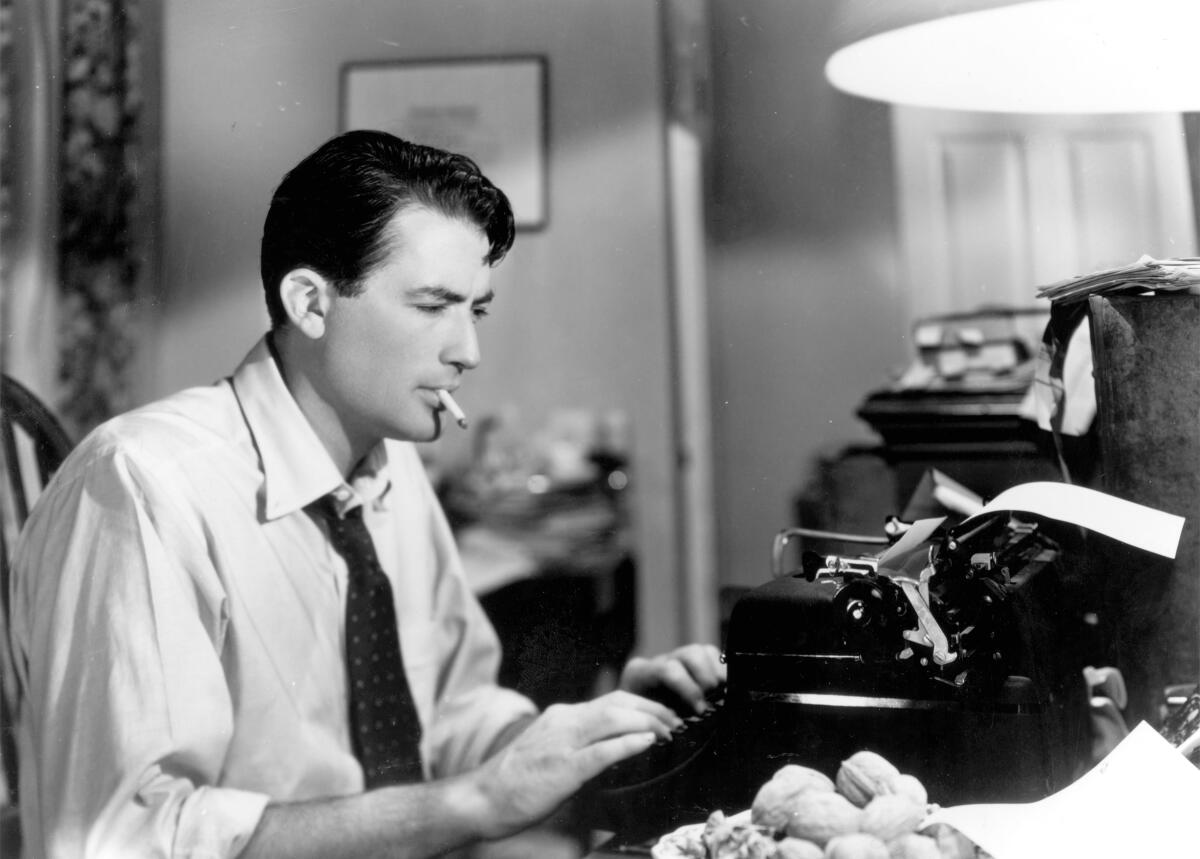From the Archives: Award-challenging feature makes debut

- Share via
“Gentleman’s Agreement” may be discerned as one of the most noteworthy pictures of 1947. Showing at the Fox Beverly and Palace theaters, which last year at this time housed the Academy Award-winning “Best Years of Our Lives,” this feature also will probably spur many voters to recognize its merits at the big Oscar event. Whether or not it will be the triumphant production — and that will depend largely on the psychology and mood of the balloters — certainly it seems probable that it will gather honors for a performance or two.
Essentially this is a film that will appeal to those who believe that a story of this type should be made, and that it is not a double-edged sword through raising an issue that were better left quiescent.
Minor ‘Persecutions’
To an extent, the manner of presentation may be under fire. Here is a film — as was the book from which it was derived — concerned with mental “persecutions,” and the inconveniences and unhappiness that arise because of this. Nazi-occupied Europe could furnish far more bitter, far more horrible examples of what real persecution meant. Because of this, “Gentleman’s Agreement” is bound to have a secondary impact.
It is doubtless well known by now that this picture deals with the affronts, insults and other social injuries suffered by the Jewish race under what are generally termed normal conditions. Its principal character, non-Jewish, is a magazine writer, who is instructed to approach the whole issue, or problem, from a new angle. Getting nowhere for a time, he is persuaded to pass himself off as Semitic, so that he personally may know and feel exactly what the Jew knows and feels in an environment of today.
Four Leading Characters
To highlight his impressions there are introduced a young Jewish captain returned from arduous service abroad, the girl the writer is in love with who knows what he has embarked on, another leading feminine character who is not aware of the deception he is practicing and is still full of understanding.
It is the last named who is the more honest in her reactions, whereas the girl he loves finds her viewpoint extremely complicated when the writer demands that she take what he is doing seriously in all aspects.
The picture is a series of incidents that illuminate its thesis — namely that there is social snobbery more or less violent in its manifestations as respects the Jewish race. The incidents reach a sort of grand climax when Gregory Peck, as the writer, is refused admission to a resort hotel, because it is presumed that he is of that race. This is further punctuated when he returns from this venture to discover that his young son has been abused by school companions who think that he is Jewish. That’s when discrimination cruelly hurts.
Mean Attitudes
There are many preluding instances of “attitudes” toward the Jewish people, as for instance the cafe scene where a drunk uses an opprobrious word in addressing John Garfield as the returned captain.
Much of this is in the domain of the “overtones” of life, rather than its more vital phases, yet it is quite significant. The picture is likely to inspire the non-Jewish who see it to reflect a little on whether they too have an attitude of disparagement in matters large or small toward Semitic individuals or groups. “Gentleman’s Agreement,” therefore, does not lack of impact in this particular domain, and undoubtedly succeeds in justification because of it.
Sugary Love Story
Apart from its more purposeful side, the main thread is a love story, which becomes appallingly saccharine at times — in fact, almost to the point or nausea. One can understand that the film-makers played this up as a kind of sounding board for the more important happenings. These culminate in the rift between the two figures in the romance, and the subsequent change in the character of the girl.
Peck manages a leap over even the slough of sentimentality in the picture to provide a portrayal of Academy Award distinction. He is fine in his dissembling and the carrying out of the entire program of his masquerade. It is one of his most carefully worked out performances.
Dorothy McGuire exudes sugar and sweets and incidental loveliness in her interpretation, which is admirably sustained along the line of its conception. However, the character is an irksome one.
Celeste Topnotch
Really in the Academy class for supporting honors is Celeste Holm, who brings joy and gayety, as well as good common sense to the screen in her thoroughly ingratiating rendition of her role of everybody’s friend.
Garfield is splendidly forthright and real, hitting an almost perfect pace throughout his portrayal. Anne Revere is commendably in character as Peck’s mother. Smart and interesting is the work of both Albert Dekker and June Havoc.
Dean Stockwell is a pleasing boy actor. Jane Wyatt, Sam Jaffe and Nicholas Joy contribute rather vitally to their scenes.
Elia Kazan has achieved efficient direction of the Darryl F. Zanuck production, with screen play by Moss Hart, derived from the novel by Laura Z. Hobson.
More to Read
Only good movies
Get the Indie Focus newsletter, Mark Olsen's weekly guide to the world of cinema.
You may occasionally receive promotional content from the Los Angeles Times.










